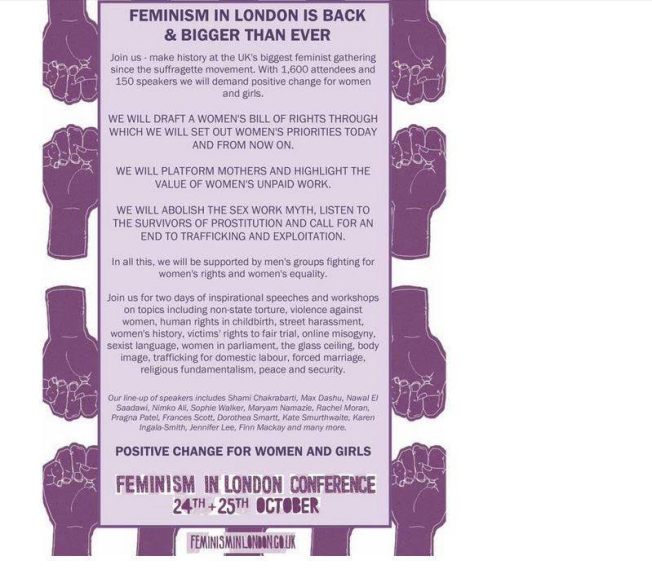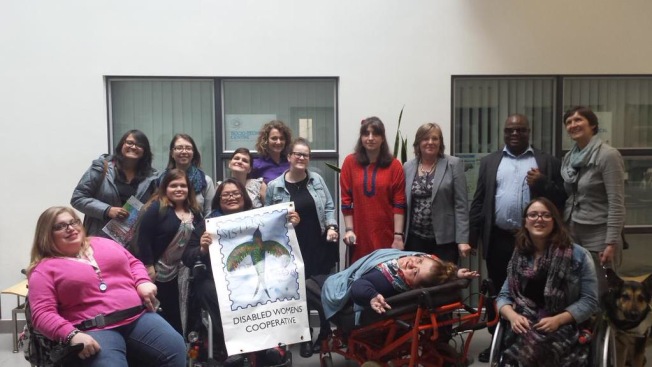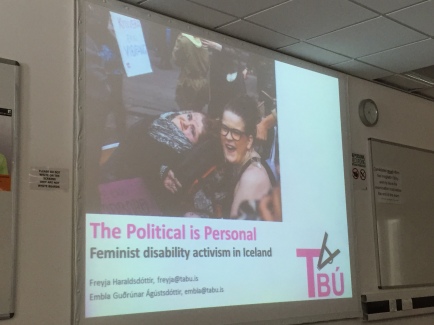This is reposted from The Conversation which uses a Creative Commons Attribution NoDerivatives licence and with kind permission from Kate Ellis. We think this fits in very well with what was voiced at the panel on disabled women at Feminism in London.
The sometimes uneasy relationship between feminist groups and disability activists was highlighted last weekend, when online Australian feminist group Destroy the Joint (DTJ) blocked and banned a number of high-profile Australian disability activists, claiming the women were in breach of their rules.
DTJ had called for submissions to the hashtag #beingawoman on its Facebook page, sparked by a Buzzfeed article featuring both lighthearted and serious tweets reflecting on modern womanhood.
Several disability activists began posting their experiences, only to be deleted for being “repetitive, circular and off topic”.
The comments that were deleted included the following:
My doctor told me to get a hysterectomy or change my tampon in my office because there was no accessible toilet nearby at my workplace #beingawoman
when people deny my sexuality because they think disabled people having sex is disgusting #beingawoman
DTJ banned the commenters from its Facebook page, for “spamming this post and page with a large number of obvious half truths and distortions”.
After a number of members and disability activists encouraged the group to reconsider its stance on intersectional feminism, DTJ issued an apology yesterday afternoon:
Dear Destroyers,
Let us begin with a belated and unreserved apology about the way we have handled the comment moderation in this instance [the #beingawoman incident]. We acknowledge we can always be more inclusive.
We are constantly discussing ways we can achieve this and no woman living with disability should be excluded from this page. Anyone who has been banned as a result of this will be unbanned. Please email jointdestroyer@gmail.com so we can be thorough about this.
It has always been our mission to include everyone and Counting Dead Women includes all women who have been killed as a result of gendered violence.
While it was a disappointing weekend for those of us who identify as both disabled and feminist, the gaffe has prompted a reflection on the ways disability politics are essential to feminist politics.
Intersectional feminism
Disability is a feminist issue and the silencing of disabled voices and experiences does not further the feminist cause. While the women posting on DTJ may have experienced gendered oppression, such as domestic violence, they are simultaneously affected by ableism.
American law professor Kimberlé Crenshaw described the ways minority groups experience multiple and overlapping oppression as intersectionality in 1989.
Women with Disabilities Australia recognises that, for women with disabilities, the effects of gendered oppression are compounded. As Sue Salthouse and Carolyn Frohmader explained in a 2004 presentation for the group:
Low levels of education relegate women with disabilities to lower echelons of society, limit their access to information and their ability to interpret it, limit their life choices and limit their ability to achieve financial and living independence.
Women with disabilities are also more likely to suffer domestic violence and sexual assault.
Feminist blogger and activist Clementine Ford told me via Facebook that this is the reason why disability politics must be included in feminism:
It is vital for feminism to focus on the impact of sexual violence, but how can we do that properly if we don’t acknowledge that 90% of women with an intellectual disability have experienced sexual assault?
Reproductive rights are core to feminism, yet they cannot be discussed without also hearing from the women whose impairments have led to doctors and carers deciding – without their permission – they must be sterilised in order to prevent the physical aftermath of sexual violence becoming a “problem”.
Just today, I read an article about two parents with cerebral palsy who have been “allowed” to keep their child. The dehumanisation of women with disabilities is appalling, but even worse is the way these issues are marginalised even within feminism.
Disability politics marginalised within feminism
In Integrating Disability, Transforming Feminist Theory (2002), Rosemarie Garland Thomson explains how both women and people with disabilities are considered “deviant and inferior” within cultural discourse and subsequently excluded from participation in public and economic life.
Other disability theorists suggest the reason women with disabilities have been excluded from mainstream feminist circles is because they are a reminder of vulnerability and lack of control, identities feminists have traditionally sought to reject.
Whereas disability was once thought of as an individual’s medical problem to overcome, following the work of disability activists such as the late Stella Young we are increasingly coming to recognise disability as a problem related to inaccessibility and negative attitudes. Disability, like gender, is a social construct.
We are all women
Back in 1988, disability theorist Susan Wendell called for a “feminist theory of disability” as a way to move forward in both disability politics and feminist theory. Wendell argued the oppression of disabled people is closely linked to the cultural oppression of the body. She believed a feminist theory of disability would “[liberate] both disabled and able-bodied people”.
Disability activist Samantha Connor, who was the first to be banned on DTJ for contravening its commenting guidelines, continues to see the importance of mainstream feminism in breaking down power imbalances for people with disabilities. As Connor explained to me:
We are all women, and the issues we face are issues faced by mainstream feminism, not by individuals or minority collectives.
The incident illustrates an important truth: being aware of intersectional oppression in 2015 should not be an optional “extra”, but fundamental to any social justice movement.
Correction: a previous version of this article contained a paragraph stating that criticism had also been also been levelled at DTJ over allegedly failing to include women with disabilities in their regular count of women who have died as a result of domestic violence or abuse. While that criticism exists, it is not substantiated.
Kate Ellis
Dr Katie Ellis is a Senior Research Fellow in the Internet Studies Department at Curtin University. She holds an Australian Research Council (ARC) Discovery Early Career Researcher Award studying disability and digital television. She has worked with people with disabilities in the community, government, and in academia and has published widely in the area of disability, television, and digital and networked media, extending across both issues of representation and active possibilities for social inclusion. Her most recent book with Gerard Goggin is ‘Disability and the Media’



















 Screening AccSex: Disabled Women Activism & Sexuality event, University of Leeds, 2015
Screening AccSex: Disabled Women Activism & Sexuality event, University of Leeds, 2015 Interrogating queer,crip & the body: An international symposium
Interrogating queer,crip & the body: An international symposium

